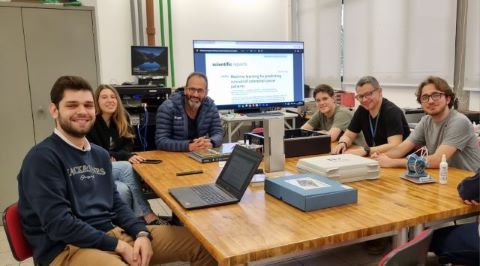cancer
Artificial intelligence can predict the survival of colorectal cancer patients with up to 80% accuracy.
Study published in Scientific reports It suggests that machine learning-based algorithms can help formulate treatment protocols and plan health services
cancer
Artificial intelligence can predict the survival of colorectal cancer patients with up to 80% accuracy.
Study published in Scientific reports It suggests that machine learning-based algorithms can help formulate treatment protocols and plan health services

Invasive adenocarcinoma, which is the most common type of colorectal cancer (Photo: Nephron / Wikimedia Commons)
Giulia Moioli | FAPESP Agency – Stady Released In the magazine Scientific reports It indicates that artificial intelligence (AI)-based models are able to predict death and survival rates for patients with colorectal cancer with approximately 80% accuracy. According to the authors, the results suggest that these tools can be useful for planning and evaluating health services, as well as guiding referral protocols.
Colorectal adenomas are one of the most common types of cancer in the world, with approximately 2 million new cases annually and an increasing trend in this number. In Brazil, data from the National Cancer Institute (INCA) indicate that 44,000 new cases appear annually, 70% of which are in the southeast and south regions.
AI-based machine learning techniques have been increasingly used to predict mortality and survival rates due to their ability to improve automatically, without the need for continuous programming – unlike statistical models used in epidemiological studies, which as reality changes become outdated and less relevant. precise.
the study, He supported By FAPESP within the scope of the project “Control of Cancer in the State of São Paulo (ConeCta-SP): from knowledge to action”, which designs strategies to control the disease in a short period of time, and was one of the first to predict the survival of cancer patients based on a database Great use of artificial intelligence and validation of these models in Brazil. The work involved groups from the Oncocentro Foundation of São Paulo State (Fosp), the University of São Paulo School of Public Health (FSP-USP), AC Camargo Hospital, and the Mauá Institute of Technology (IMT).
(Photo: Researchers Group)
Identified information on the socioeconomic status, clinical characteristics, characteristics of care and survival of 31,916 colorectal cancer patients treated in more than 70 hospitals in São Paulo State between 2000 and 2021 belongs to the São Paulo State Hospital Cancer Registry (RHC). -SP), managed by Fosp.
The researchers evaluated and compared the prediction validity of three artificial intelligence algorithms: Random Forest, Native Bayes, and XGBoost. The latter provided the best result, correctly predicting 77% of deaths and 77% of survival (at one, three, and five years from tumor diagnosis).
“The performance of the three models showed a success rate of between 76% and 77%,” says Lucas Puck Cardoso, a researcher at the Center for Systems Embedded Electronics (NSEE) at the Maua Institute of Technology and first author of the study. “In addition, it was possible to obtain the most important patient data for the predictions – established as input to the artificial intelligence – allowing a better understanding of the magnitude of the impact of this information and validation of it with the knowledge already published in the area.”
The most important input in all the models was the clinical classification of the cancer, which contains information about the grade of the disease – the more advanced the disease, the more conclusive it is in predicting death. Other important information was related to the treatment performed, such as surgery, radiotherapy and chemotherapy, as well as the presence of recurrence, which indicates whether the cancer has returned or not, the patient’s age and the year the disease was diagnosed.
The variables that best predicted survival in XGBoost were clinical stage, surgery performed, hospitalization, age, and year of diagnosis.
Practical and methodological progress
According to the authors, this study has the potential to be the first of many that will allow simulations of scenarios and effects on cancer patient survival. Through the information obtained, better clinical and administrative decisions can be made in public health.
“This type of evaluation can point to models that will serve as tools for decision-making by managers in moments of potential disruption in health services, as occurs in epidemics, for example,” he explains. Tatiana Toporkovprofessor at FSP-USP and co-author of the article.
Vanderlei Cunha BarrowThe Mawa Institute of Technology professor also highlights the nature of assessing the boundaries between statistical methods and those using machine learning. “Such an investigation might also lead to a systematic review, with new data included and others excluded.”
Article Machine learning to predict survival of colorectal cancer patients It can be read on: www.nature.com/articles/s41598-023-35649-9.

“Wannabe internet buff. Future teen idol. Hardcore zombie guru. Gamer. Avid creator. Entrepreneur. Bacon ninja.”

